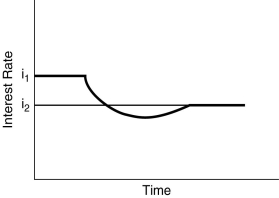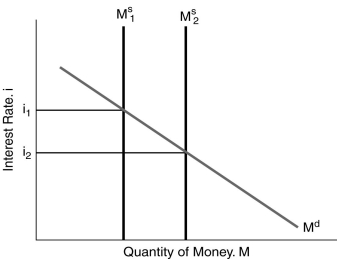Exam 4: Why Do Interest Rates Change?
A ________ prefers stock in a less risky asset than in a riskier asset.
B
Higher expected interest rates in the future ________ the demand for long-term bonds and shift the demand curve to the ________.
C
How is the equilibrium interest rate determined in the bond market? Explain why the interest rate will move toward equilibrium if it is temporarily above or below the equilibrium rate.
In layman terms, equilibrium means where the demand and supply are equal or where two things converges. The interest rates are also stated as per the equilibrium prevailing in the market. Hence the interest rates can be above or below the equilibrium price tempoarrily, but the need to converge towards the equilibrium in longer terms or towards their mayturity.if the interest rates are above the equilibrium rate they will tend to decline towards the equilibrium as they approaches maturity or in near terms. Same happens when the interest rates are below the equilibrium rates they will tend to increase towards the equilibrium rate. Hence its a rule of thumb we can say, that the interest rates in the bond markets whetehr in US or glibally are determined on the basis of equilibrium rates prevailing in the markets.
When the price of a bond is ________ the equilibrium price,there is an excess demand for bonds and the price will ________.
When the growth rate of the money supply is decreased,interest rates will rise immediately if the liquidity effect is ________ than the other effects and if there is ________ adjustment of expected inflation.
If the Fed wants to permanently lower interest rates,then it should lower the rate of money growth if
An increase in an asset's expected return relative to that of an alternative asset,holding everything else unchanged,raises the quantity demanded of the asset.
When the growth rate of the money supply is increased,interest rates will rise immediately if the liquidity effect is ________ than the other effects and if there is ________ adjustment of expected inflation.
Investors make their choices of which assets to hold by comparing the expected return,liquidity,and risk of alternative assets.
When the expected inflation rate increases,the demand for bonds ________,the supply of bonds ________,and the interest rate ________.
Figure 4.5
 -Figure 4.5 illustrates the effect of an increased rate of money supply growth.From the figure,one can conclude that the liquidity effect is ________ than the expected inflation effect and interest rates adjust ________ to changes in expected inflation.
-Figure 4.5 illustrates the effect of an increased rate of money supply growth.From the figure,one can conclude that the liquidity effect is ________ than the expected inflation effect and interest rates adjust ________ to changes in expected inflation.
During an economic expansion,the supply of bonds ________ and the supply curve shifts to the ________.
When the demand for bonds ________ or the supply of bonds ________,interest rates rise.
A rise in the price level causes the demand for money to ________ and the demand curve to shift to the ________.
Figure 4.3
 -In Figure 4.3,the factor responsible for the decline in the interest rate is
-In Figure 4.3,the factor responsible for the decline in the interest rate is
Lower expected interest rates in the future ________ the demand for long-term bonds and shift the demand curve to the ________
When prices in the stock market become more uncertain,the demand curve for bonds shifts to the ________ and the interest rate ________.
In his liquidity preference framework,Keynes assumed that money has a zero rate of return; thus,when interest rates ________ the expected return on money falls relative to the expected return on bonds,causing the demand for money to ________.
Explain why the marginal contribution of an asset to the risk of a portfolio does not depend on the risk of the asset in isolation.
When the demand for bonds ________ or the supply of bonds ________,interest rates fall.
Filters
- Essay(0)
- Multiple Choice(0)
- Short Answer(0)
- True False(0)
- Matching(0)